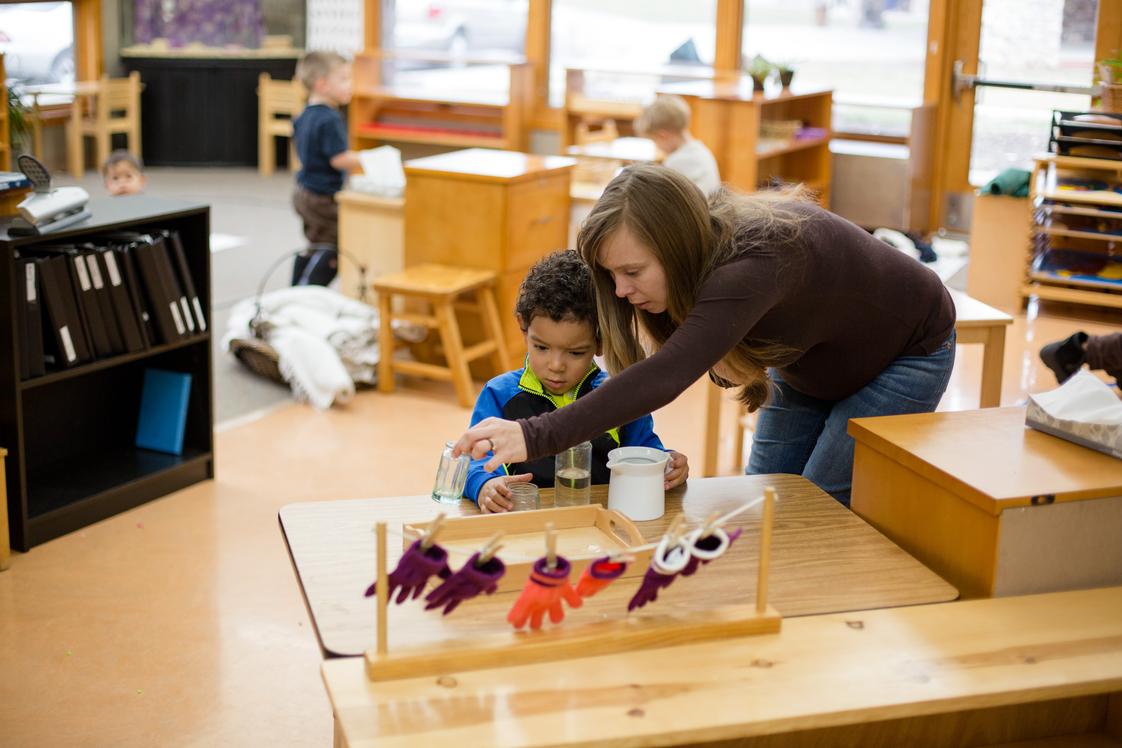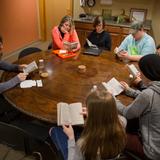Serving 486 students in grades Prekindergarten-12, Community Montessori ranks in the bottom 50% of all schools in Indiana for overall test scores (math proficiency is bottom 50%, and reading proficiency is bottom 50%).
The percentage of students achieving proficiency in math is 20% (which is lower than the Indiana state average of 38%). The percentage of students achieving proficiency in reading/language arts is 39% (which is lower than the Indiana state average of 41%).
The student:teacher ratio of 14:1 is lower than the Indiana state level of 15:1.
Minority enrollment is 16% of the student body (majority Hispanic), which is lower than the Indiana state average of 37% (majority Hispanic).
Quick Stats (2025)
- School Type: Charter School
- Grades: Prekindergarten-12
- Enrollment: 486 students
- Student:Teacher Ratio: 14:1
- Minority Enrollment: 16%
- Graduation Rate: ≥90% (Top 50% in IN)
- Overall Testing Rank: Bottom 50%
- Math Proficiency: 20% (Btm 50%)
- Reading Proficiency: 39% (Btm 50%)
- Science Proficiency: 25-29% (Btm 50%)
- Source: National Center for Education Statistics (NCES), IN Dept. of Education
School Overview
Community Montessori's student population of 486 students has declined by 11% over five school years.
The teacher population of 34 teachers has declined by 5% over five school years.
School Type
Grades Offered
Grades Prekindergarten-12
Total Students
486 students
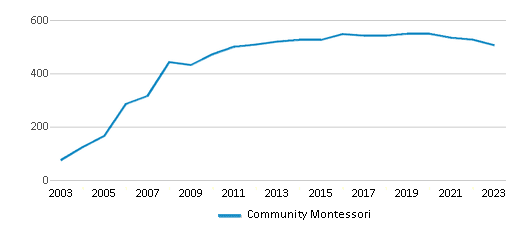
Gender %
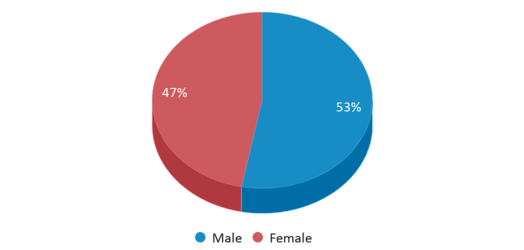
Total Classroom Teachers
34 teachers
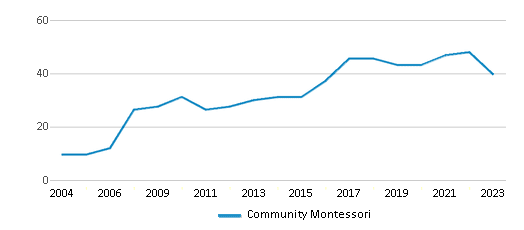
Students by Grade
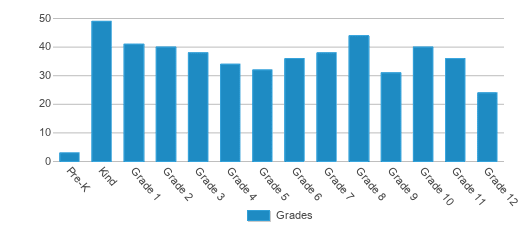
School Rankings
Community Montessori ranks within the bottom 50% of all 1,763 schools in Indiana (based off of combined math and reading proficiency testing data).
The diversity score of Community Montessori is 0.29, which is less than the diversity score at state average of 0.56. The school's diversity has stayed relatively flat over five school years.
Overall Testing Rank
#1247 out of 1763 schools
(Bottom 50%)
(Bottom 50%)
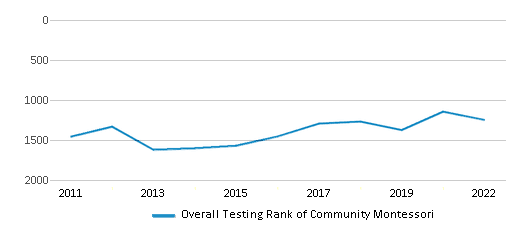
Math Test Scores (% Proficient)
20%
38%
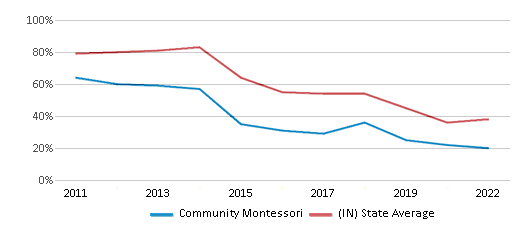
Reading/Language Arts Test Scores (% Proficient)
39%
41%
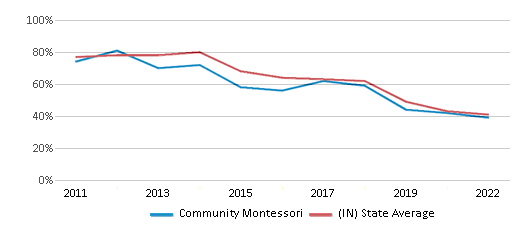
Science Test Scores (% Proficient)
25-29%
34%
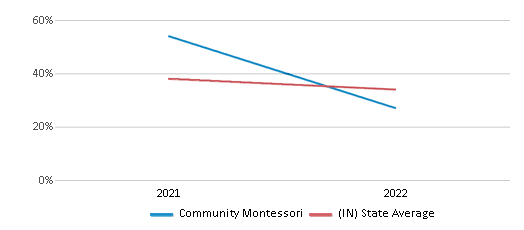
Student : Teacher Ratio
14:1
15:1
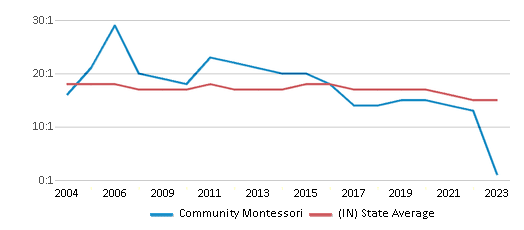
American Indian
n/a
n/a
Asian
1%
3%
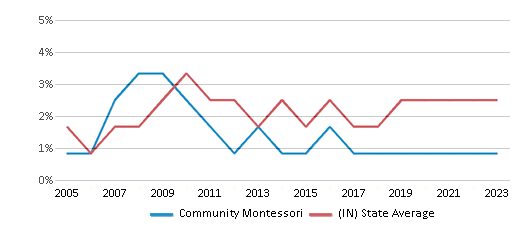
Hispanic
4%
15%
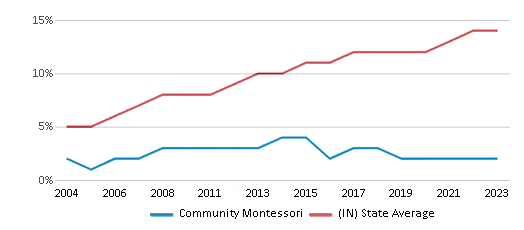
Black
2%
13%
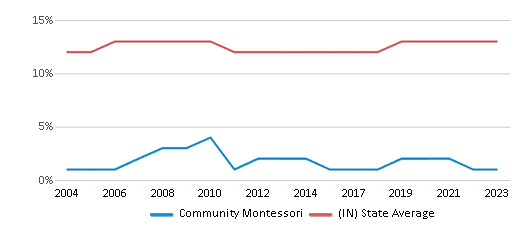
White
84%
63%
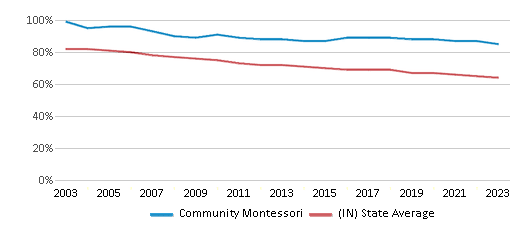
Hawaiian
1%
n/a
Two or more races
8%
6%
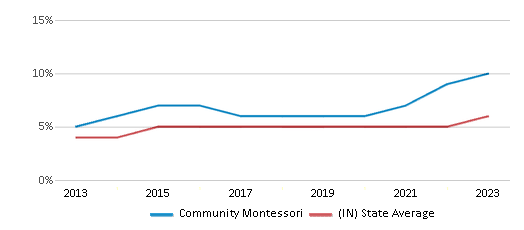
All Ethnic Groups
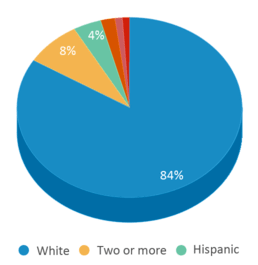
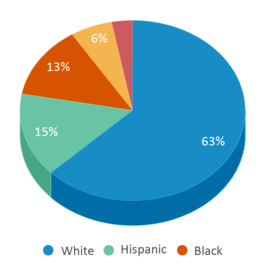
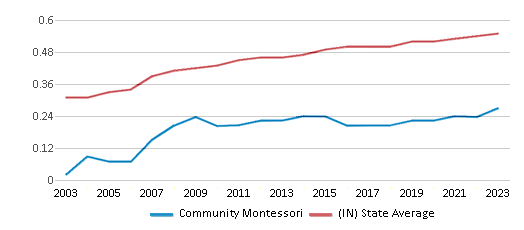
Graduation Rate
≥90%
88%
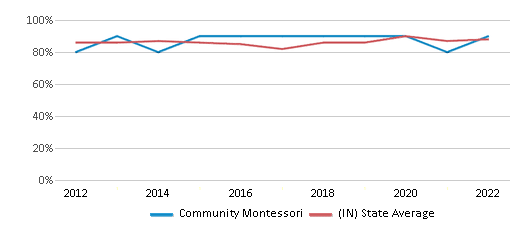
Eligible for Free Lunch
11%
43%
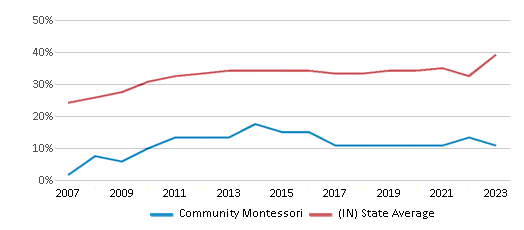
Eligible for Reduced Lunch
9%
6%
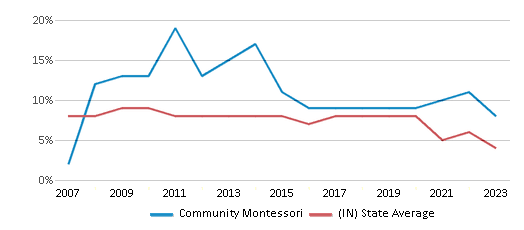
School Statewide Testing
School District Name
Source: National Center for Education Statistics (NCES), IN Dept. of Education
School Notes
- Community Montessori can be for every child, but may not be for every family. We offer a comprehensive educational approach that is centered around each individual learner and partnering in his/her continued growth in connecting knowledge for lifelong learning.
- Under guidance, children and teens learn by making discoveries and asking questions, all the while cultivating concentration, motivation, selfdiscipline, and a love of learning. Our beliefs about learning are progressive and based on current research about how we learn and conceptualize new information. Families should not choose Community Montessori as an educational option if you are looking for a "quick fix" or are interested in outsourcing education. Families that commit to being involved in learning, modeling that learning happens all the time and everywhere, and want to be a partner in the growth of their child will find the most success at Community Montessori.
- Early Education children (including kindergarten) ages three through six come together in this homelike environment to learn by interacting with one another and educational materials. They are guided in this process by caring adults with extensive training in early childhood development. Content is presented on an individual basis upon readiness with a focus on independence, concentration, coordination, and a sense of order.
- Elementary Program (1st - 6th grade) Compassionate educators support children ages six through twelve in creating dynamic learning environments in which they feel empowered to engage in endless content areas based on their interests. The day includes a combination of childled and adult directed activities to encourage ownership and a sense of community.
- Teen`s Program (7th - 12th grade) Learning should be meaningful and purposeful. Respectful adults (Advisors) support teens twelve through eighteen years old, in becoming reflective learners who are willing to take risks and ask questions that encourage thought and the attainment of knowledge. This program allows teens to set specific academic, moral/emotional/social, and career goals to encourage life long learning skills. Because of the unique nature of our Teen`s Program, teens cannot apply after 10th grade year.
Profile last updated: 02/09/2025
Frequently Asked Questions
What is Community Montessori's ranking?
Community Montessori is ranked #1247 out of 1,763 schools, which ranks it among the bottom 50% of public schools in Indiana.
What percent of students have achieved state testing proficiency in math and reading?
20% of students have achieved math proficiency (compared to the 38% IN state average), while 39% of students have achieved reading proficiency (compared to the 41% IN state average).
What is the graduation rate of Community Montessori?
The graduation rate of Community Montessori is 90%, which is higher than the Indiana state average of 88%.
How many students attend Community Montessori?
486 students attend Community Montessori.
What is the racial composition of the student body?
84% of Community Montessori students are White, 8% of students are Two or more races, 4% of students are Hispanic, 2% of students are Black, 1% of students are Asian, and 1% of students are Hawaiian.
What is the student:teacher ratio of Community Montessori?
Community Montessori has a student ration of 14:1, which is lower than the Indiana state average of 15:1.
What grades does Community Montessori offer ?
Community Montessori offers enrollment in grades Prekindergarten-12
What school district is Community Montessori part of?
Community Montessori is part of Community Montessori Inc School District.
School Reviews
Review Community Montessori. Reviews should be a few sentences in length. Please include any comments on:
- Quality of academic programs, teachers, and facilities
- Availability of music, art, sports and other extracurricular activities
Recent Articles

What Is A Charter School?
Explore the world of charter schools in this comprehensive guide. Learn about their history, how they operate, and the pros and cons of this educational innovation. Discover key facts about charter schools, including admission policies, demographics, and funding, as well as what to look for when considering a charter school for your child.

10 Reasons Why High School Sports Benefit Students
Discover the 10 compelling reasons why high school sports are beneficial for students. This comprehensive article explores how athletics enhance academic performance, foster personal growth, and develop crucial life skills. From improved fitness and time management to leadership development and community representation, learn why participating in high school sports can be a game-changer for students' overall success and well-being.

February 05, 2025
Understanding the U.S. Department of Education: Structure, Impact, and EvolutionWe explore how the Department of Education shapes American education, from its cabinet-level leadership to its impact on millions of students, written for general audiences seeking clarity on this vital institution.


